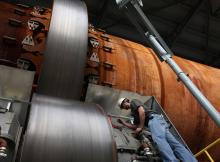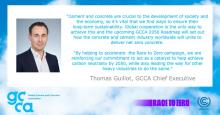
The Global Cement and Concrete Association's chief executive, Thomas Guillot, and the leaders of GCCA member companies have made the united rallying call as they begin a major conference in Zurich.
Concrete is the second most-used material on earth after water and the backbone of modern infrastructure. It is used to build homes, schools, hospitals, roads, bridges, and tunnels and helps to provide clean water and green energy. But with so much of it used worldwide, it currently accounts for 7% of global CO2 emissions. The world's leading manufacturers - all members of the Global Cement and Concrete Association - have pledged to eliminate those emissions by 2050, in line with GCCA's Roadmap for Net Zero Concrete – the first heavy industry to set out such a detailed plan.
Addressing around 200 industry leaders from across the globe, who've gathered in Zurich, the GCCA chief executive, Thomas Guillot, said: "We applaud all the action our members are taking to implement carbon-cutting measures, and the latest data shows emissions are coming down. But many challenges remain, which we must overcome, if we are to achieve net zero, including enabling policies and regulations from governments across the world, which often don't yet exist."
"So today, I urge every manufacturer across the world, who has not yet done so to join our pledge to eliminate emissions by 2050, But I also implore all governments to work with our essential industry to deliver the policy framework that can create the favourable conditions to unlock the transition."
And speaking via video to the conference, the secretary-general of the United Nations, António Guterres, supported the call for maximum action towards net zero, saying he wanted to see "concrete pledges from the concrete industry."
He told the conference that concrete is "fundamental to building a better world… and we have no time to lose if we are to limit the global temperature rise to 1.5 degrees centigrade."
"Science tells us that requires cutting global greenhouse emissions by almost half by 2030. That means taking a quantum leap in climate action – and slashing global emissions. Starting now."
The UN secretary-general set out three ambitions for the industry, including ending the use of coal-fired power in cement production, working more closely with governments, especially G20 countries, to speed up decarbonisation, and setting ambitious emission targets and transition plans in line with UN guidelines.









